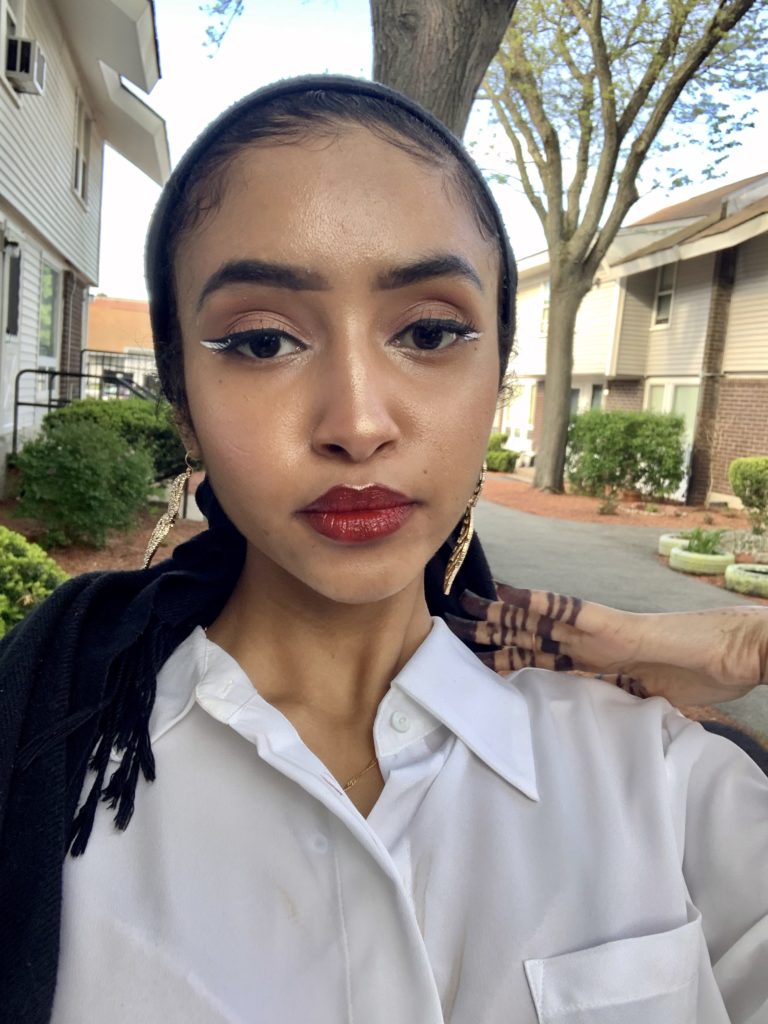
Addressing the lack of representation of young Black and brown artists
For the seventh interview in this series asking people active in the Boston arts scene about their thoughts on how to rebuild it after the pandemic, I talked to Sumeya Ali—a Boston-based surrealist artist from an immigrant family who is currently attending Simmons University. She first began painting at Artists for Humanity, a local nonprofit employing creative youth. Currently, in her artwork, Ali is exploring her identity as a Black Muslim woman from Somalia living in Boston. Check out the video of our full conversation below.
On what has gone before
Prior to the pandemic Black and brown artists in Boston—especially those who are still in college or even in high school—often were ignored for large scale opportunities like creative employment, gallery representation or even grants and funding to support our creative work. It can be difficult to find tangible resources as a young artist. I noticed this was not only true for me but as well as other creators who were of marginalized backgrounds. We are challenged and discouraged by those who have historically held onto resources and access to better opportunities. I would like to recognize that as a form of gatekeeping where people from wealthy and privileged backgrounds undermine the value of artists who are creating based on their own backgrounds, which may not be a background of wealth or racial privilege. Because such work does not fit into what the dominant groups that are represented in Boston’s art galleries or art museums, it is ignored. It is challenging to be in art gallery spaces that are frequented by art collectors who are searching for the next Monet or Van Gogh. Those art collectors may have a preconceived notion of what “good art” is that has no regard for perspectives beyond their own.
There is a consistent thread in Boston where those with power in the art scene—like gallery owners, instructors, and curators—will exercise that power in a way that reproduces narratives of a Boston that has no wealth inequality and is full of accessible opportunities everywhere for people of all identities. We know this is simply not true. The pandemic has exacerbated this because now creatives more than ever are searching for ways to support their practice during an unpredictable moment in our lives.
On what is still to come
One way I have already begun addressing the lack of representation of young Black and Brown artists is by teaching painting to other high school age immigrant youth through a program called the Youth Ubuntu Project led by two Boston organizations, African Community Economic Development of New England and Center to Support Immigrant Organizing. I am the lead instructor for their arts and activism program where I instruct 25-35 youth in the summer and about 13-15 in the school year. I began working with ACEDONE and CSIO on their joint Youth Ubuntu Project after my time at Artists for Humanity. I took the skills I learned from AfH to YUP—and remember the importance of having a community of fellow artists that continue to inspire you to move forward. For me at AFH this community was youth artists my age who were experiencing similar things as teens growing up in Boston, as well as mentors who were professional artists there to guide us both artistically and socially/emotionally. They also encouraged us to keep an eye out for art opportunities like grants for youth artists and submissions for galleries or exhibitions. Right now, I am reproducing that in my own arts and activism curriculum for high school youth by focusing on self-determination as a young Black or brown person living in a historical time.
I would also like more institutional support from our city to support young Black and brown artists through funding, creating community centers where art courses are offered at accessible rates. Boston does support art through the Boston Cultural Council’s efforts but I would love to see that support reach everyone in Boston, especially those who may not otherwise be introduced to fine arts like painting!
DigBoston Interview with Sumeya Ali
Jason Pramas is executive editor and associate publisher of DigBoston. He holds an MFA in visual arts.